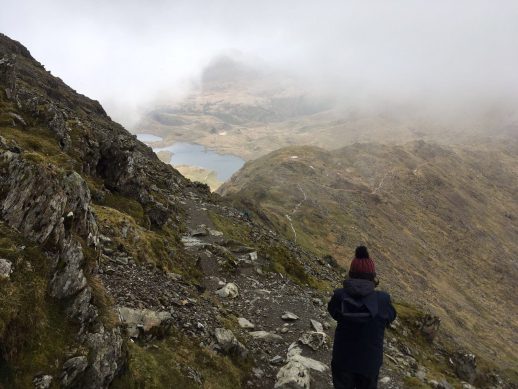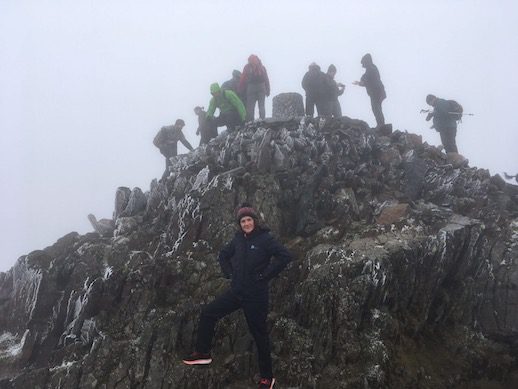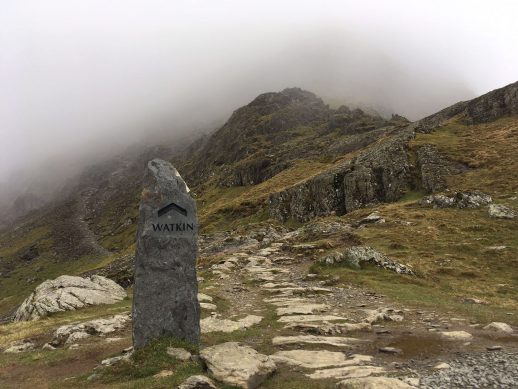Nell Frizzell documents her outdoor pursuits in a new monthly column. Pictures by Nick Stanton
It is a very strange thing to be heaving your knees up scrabble stone paths, through mists and mellow bursts of sunshine, humming Hen Wlad Fy Nhadau while, just a lamb’s bleat away, and entirely unknown to you, the Prime Minister is plotting to kick the parliamentary system down a well.
And yet, so is how I spent a wet and wild Easter weekend in North West Wales: surrounded by rustling, occasionally tear-stained adolescents trying to get through their Duke of Edinburgh as Theresa May, just a few miles down the valley, hatched her unlikely and unhelpful plan.
It will probably come as little surprise to hear that the only award I’d willingly receive from Prince Philip is an entire refund of every estimated three hundred and thirty four million pounds we pay in taxes to the monarchy every year. Yet, somehow, I have lived the majority of my adult life like some desperate, dirty-nailed teenager constantly auditioning for her DofE. The cycling, the walking, the swimming, the volunteering, the amateur roofing and even more amateur map-reading – it all looks just a little like I’m making up for a fat and bookish adolescence. By dint of the sheer amount of time I’ve spent in waterproof trousers (once resulting in an extremely interesting skin situation while cycling the width of Ireland), I probably qualify for at least a bronze.
The weekend was, in fact, sandwiched between two royal bloods. The Duke of racial gaffes, orienteering and stainless steel camping stoves on one hand; and the melancholy Prince Llewellyn on the other. Let me explain. According to the great lump of stone I stood before in Beddgelert on the sort of rainy Sunday the Irish call ‘soft’:
In the 13th century Llewelyn, prince of North Wales, had a palace at Beddgelert. One day he went hunting without Gelert, ‘The Faithful Hound’, who was unaccountably absent.
So far, you may think, so good. But, hold on to your bara brith because things are about to go downhill like a boiled egg.
On Llewelyn’s return the truant, stained and smeared with blood, joyfully sprang to meet his master. The prince alarmed hastened to find his son, and saw the infant’s cot empty, the bedclothes and floor covered with blood.
I once saw a dog after it had eaten an entire chicken off my grandmother’s sideboard. It had that sort of queasy, guilty, pleasure-drunk look I would later come to recognise on the face of student boys as they walked home in the early hours. This is how I imagine Gelert’s poor, hairy face. It goes on:
The frantic father plunged his sword into the hound’s side, thinking it had killed his heir. The dog’s dying yell was answered by a child’s cry.
Llewelyn searched and discovered his boy unharmed, but nearby lay the body of a mighty wolf which Gelert had slain. The prince filled with remorse is said never to have smiled again. He buried Gelert here.
So, dog kills wolf, saves baby, angry king accidentally kills dog, then finds baby, and nobody ever smiles again.
I first discovered the legend of Gelert many years ago while driving through North Wales with my mother using – as is our habit – a four year out-of-date road atlas to try and find likely places for me to swim and the two of us to camp. I have since learned that this ‘faithful hound’ trope is found all over the world – there is an alpine legend that involves a shepherd shooting his sheepdog after finding it covered in sheep blood, only to later find a dead wolf in the stable; in India, there’s a black snake instead of a wolf and a faithful mongoose instead of a hunting dog; and in Malaysia there’s a story about a tame bear, kept by a hunter to guard his daughter, who suffers a similar fate.
I’ve always thought it was rather rough going on Prince Llewellyn’s son that, although he survived, to take on a kingdom and be a loving heir, his sour-faced father never smiled again. Imagine that: “Daddy! Daddy! I carved you this little wooden sparrow today, while walking in the woods.” “Sure, sure you did, you little shit. But you’re no dog. God, I miss that dog. [starts quietly weeping]”.
Talking of large stone monuments, the day before the rainy pilgrimage to Beddgelert, my partner and I had taken a stroll up the Watkins Path to the top of Snowdon. It all went very well, until I lost the path in a clinging tupperware of mist and ended up climbing, fairly vertically, the final 100 or so metres up ice-dusted rocks as a couple (with two dogs strapped to their waistbands like wallet chains) swore and scrambled up the shingle behind me. Only to discover at the top that the cafe was closed and the blood had drained out of my hands, leaving me waving two white and waxen pork gloves at the summit and murmuring ‘there it is’.
On the way up, we passed a monument to where Prime Minister Gladstone, in 1892, had spoken to a huge crowd about Justice for Wales, followed by a lovely bit of singing. I wondered, as I walked up the pink slabs of rock and watched the sticky lump of cloud cling to the summit, what old Gladstone would have made of Wales’ current situation; one of the greatest benefactors of European Union funding, yet somehow one of the places to overwhelmingly vote Leave.
On our way down, we stopped again, just a little further along the path from Gladstone’s thumping place, so I could take a fresh and cool green swim in one of the Nant Gywnant waterfalls. Small is this high stream, Lord, a baby on a rushy bed, as Dylan Thomas nearly said.
As I slipped under the cold green stream, as sharp and beautiful as the noise of a flute, as the bite of an apple, as the ringing of silver, my heart thumped and the mountains around me seemed to soar in a brief moment of golden sunshine. As they say in the anthem, Old land of the mountains, paradise of the poets, Every valley, every cliff a beauty guards; Through love of country, enchanting voices will be, Her streams and rivers to me.
Now, if you’ll excuse me, I can hear a howling…


